Syria
Syria new sig/date (2017) 2,000-pound note (B632b) confirmed
10 02, 2019 08:58 Category: Middle East
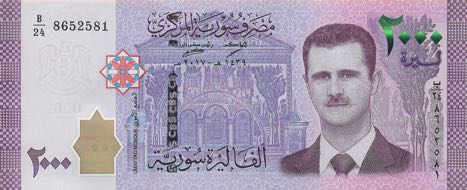
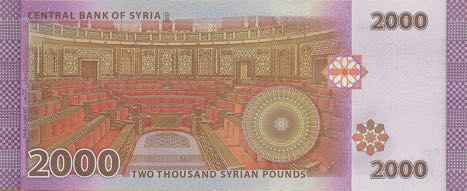
Like B632a, but new signatures and new date (2017). Prefix B/17 - B/26.
Courtesy of Sabine Leuenberger ().
30% off select chapters of The Banknote Book in print
02 12, 2019 06:43 Category: The Banknote Book
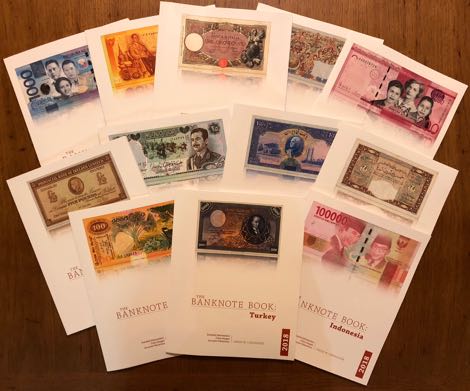
In response to customer demand, 26 of the largest chapters of The Banknote Book are now available in print.
The following chapters can now be ordered in print directly from Lulu.com or Amazon
Algeria
Argentina
Australia
Belgium
Bolivia
Bulgaria
Ceylon
Cuba
Dominican Republic
Egypt
Fiji
Germany
Indonesia
Iran
Iraq
Italy
Japan
Lebanon
Macau
Northern Ireland
Philippines
Romania
Syria
Thailand
Turkey
Venezuela
Prices range from US$24.99 to US$39.99, depending upon length, and all are professionally printed in full color on 80-pound glossy paper as perfect-bound paperback books.
Anyone purchasing from Lulu.com is entitled to a coupon code good for a free download of the PDF version of the chapter (US$9.99 value).
Use coupon code CYBERMONDAY30 when ordering on Lulu to get 15% off the list price for orders placed before midnight 3 December 2019.
Check Lulu's home page for discount codes on books and shipping.
Syria new 2,000-pound note (B632) confirmed
04 07, 2017 13:52 Category: Middle East
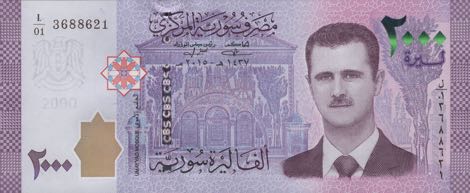
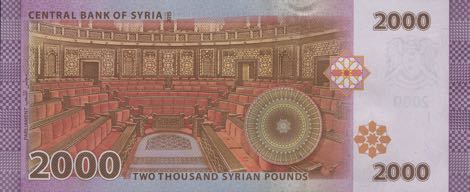
According to an AP report dated 2 July 2017, the Central Bank of Syria introduced a 2,000-pound note depicting President Bashar Assad on front and the back depicts the People's Council of Syria inside the Parliament Building in Damascus, Syria. These notes appear to have been printed by Goznak several years ago and have been introduced because the Syrian pound has crashed in value due to the civil war in Syria.
Courtesy of Claude Akl ().
Syria new 1,000-pound note (B631) confirmed
23 07, 2015 18:03 Category: Middle East
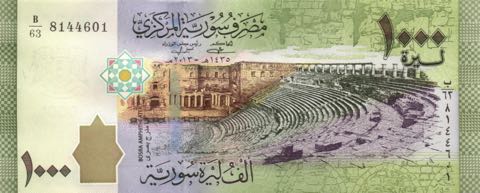
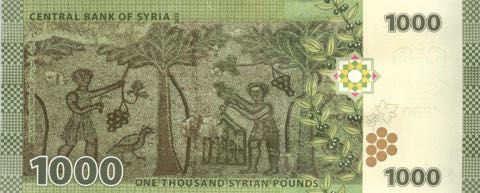
B631 (PNL): 1,000 Syrian pounds (US$6.60)
Green, purple, red, and yellow. Front: Ancient Roman amphitheater in Bosra. Back: Tile mosaic of grape harvest from ancient Romain ruins in As-Suwayda; olive branches. 4-mm wide windowed security thread with demetalized SP1000 and Arabic text. Watermark: Electrotype 1000 and eagle coat of arms. Printer: (Goznak). 155 x 65 mm.
a. 2013. Sig. 17. Prefix B/G3. Intro: 30.07.2015.
Courtesy of Hartmut Fraunhoffer (Banknote-Online), Cleo Phas, Reha Yucememis, and Christof Zellweger.
United Arab Republic chapter of The Banknote Book is now available
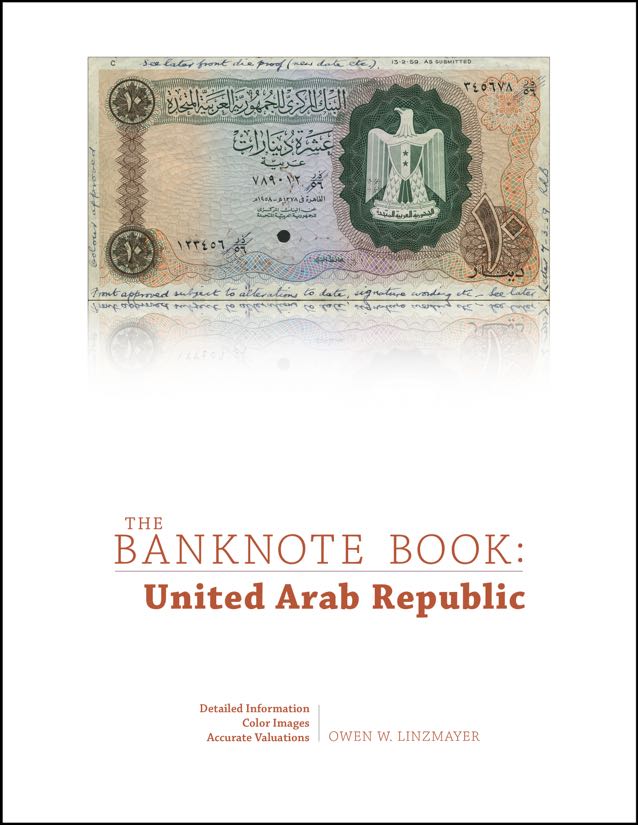
The United Arab Republic chapter of The Banknote Book is now available for individual sale and as a free download to subscribers.
This 5-page catalog covers notes of the Central Bank of the United Arab Republic dated 1958 and the Egyptian/UAR Government issues from 1958 to 1961. Revised 12 December 2016.
Each chapter of The Banknote Book includes detailed descriptions and background information, full-color images, and accurate valuations. The Banknote Book also features:
- Sharp color images of note’s front and back without overlap
- Face value or date of demonetization if no longer legal tender
- Specific identification of all vignette elements
- Security features described in full
- Printer imprint reproduced exactly as on note
- Each date/signature variety assigned an individual letter
- Variety checkboxes for tracking your collection and want list
- Date reproduced exactly as on note
- Precise date of introduction noted when known
- Replacement note information
- Signature tables, often with names and terms of service
- Background information for historical and cultural context
- Details magnified to distinguish between note varieties
- Bibliographic sources listed for further research
Subscribe to The Banknote Book
If you collect the entire world or a large number of countries, buying a subscription is the best deal because it's less expensive than buying chapters individually, and it entitles you to every chapter currently available as well as everything published—or revised (click here to see the Change Log)—during the term of your subscription.

Sign up for Email Notifications
If you would like to receive email notifications whenever a new chapter of The Banknote Book is published, please join the email list by clicking the button below.

Austrian note printing firm in scandal involving Azerbaijan and Syria
16 11, 2014 15:21 Category: Europe
A Washington Post article dated 15 November 2014 details the allegations of bribery behind Austria's banknote printing firm, Oesterreichische Banknoten-und Sicherheitsdruck, and its efforts to win bids to produce currency for Azerbaijan and Syria.
Syria new 500-pound note confirmed
19 08, 2014 12:56 Category: Middle East
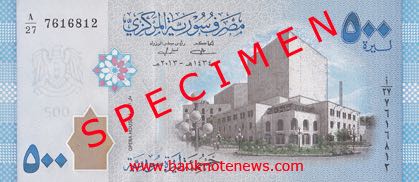
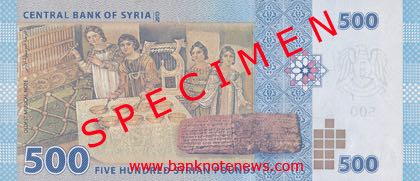
According to an article on Syrian Radio & TV dated 16 July 2014 and an article on SanaSyria dated 20 July 2014, Adib Mayala, governor of the Central Bank of Syria, has announced that a new 500-pound note has been issued on 20 July 2014, and will be dispersed early in August, and a 1,000-pound note will be issued in two months (August - September).
Existing notes of that denomination will circulate in parallel before being gradually withdrawn.
The new note is expected to join the family of 50-, 100-, and 200-pound notes (CBS B27-B29, respectively) dated 2009, introduced 27.07.2010, and printed by Oesterreichische Banknoten- und Sicherheitsdruck, a subsidiary of Oesterreichische Nationalbank, Austria’s central bank.
Mayala said the new note will have different colors, depiction, and figures, and will be made of better-quality materials “in a way to reflect the cultural and historical image of Syria and protect the banknotes from getting worn out."
Courtesy of Cleo Phas and Takis Kouvatseas.
Syria chapter of The Banknote Book is now available
11 04, 2013 23:00 Category: The Banknote Book | Middle East
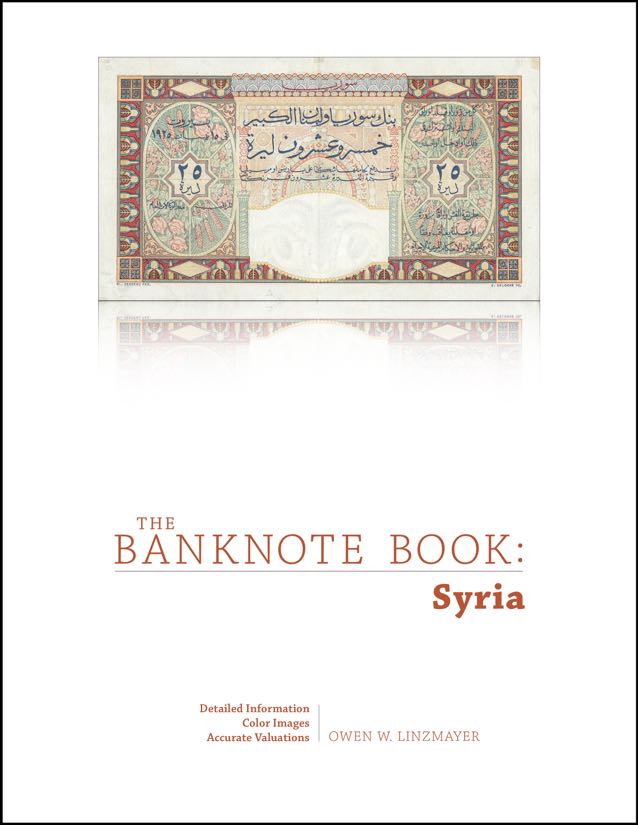
The Syria chapter of The Banknote Book is now available for individual sale and as a free download to subscribers.
This 45-page catalog covers notes issued by the Banque de Syrie (Bank of Syria) from 1919 to 1920, the Banque de Syrie et du Grand-Liban (Bank of Syria and Greater Lebanon) from 1925 to 1939, the Banque de Syrie et du Liban (Bank of Syria and Lebanon) from 1939 to 1950, the Republique Syrienne (Syrian Republic) from 1942 to 1945, the Institut d'Emission de Syrie (Issuing Institute of Syria) from 1950 to 1955, and the Banque Centrale de Syrie (Central Bank of Syria) from 1957 to present. Revised 28.10.2018.
Each chapter of The Banknote Book includes detailed descriptions and background information, full-color images, and accurate valuations. The Banknote Book also features:
- Sharp color images of note’s front and back without overlap
- Face value or date of demonetization if no longer legal tender
- Specific identification of all vignette elements
- Security features described in full
- Printer imprint reproduced exactly as on note
- Each date/signature variety assigned an individual letter
- Variety checkboxes for tracking your collection and want list
- Red stars highlight the many notes missing from the SCWPM
- Date reproduced exactly as on note
- Precise date of introduction noted when known
- Replacement note information
- Signature tables, often with names and terms of service
- Background information for historical and cultural context
- Details magnified to distinguish between note varieties
- Bibliographic sources listed for further research
Subscribe to The Banknote Book
If you collect the entire world or a large number of countries, buying a subscription is the best deal because it's less expensive than buying chapters individually, and it entitles you to every chapter currently available as well as everything published—or revised (click here to see the Change Log)—during the term of your subscription.

Sign up for Email Notifications
If you would like to receive email notifications whenever a new chapter of The Banknote Book is published, please join the email list by clicking the button below.

The Challenge: Identify items on Syrian banknotes
28 03, 2013 08:04 Category: Challenge | Middle East
I am cataloging the Central Bank of Syria's notes for publication in The Banknote Book, and I have been unable to identify a few items which appear on these notes.
The back of the 100-pound note dated 1966-1974 depicts a dam. What's the name and location of this dam?
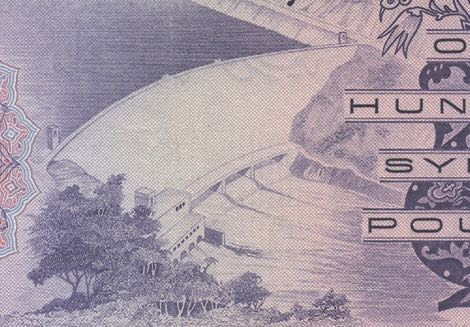
The front of the 5-pound note dated 1977-1991 depicts a female statue.
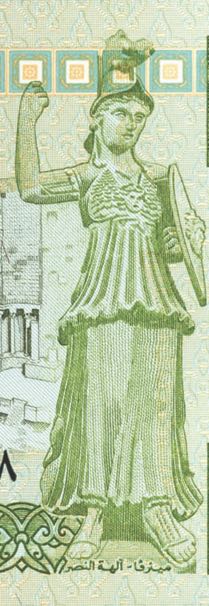
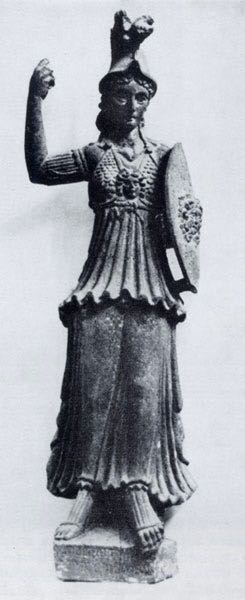
IDENTIFIED: Allāt-Minerva. Statue of the 2nd century AD from As-Suwayda, Syria (Roman province). National Museum of Damascus.
The front of the 50-pound note dated 1977-1991 depicts a female statue.
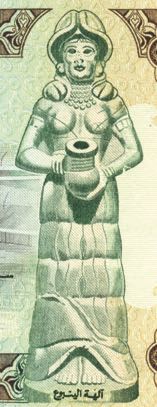
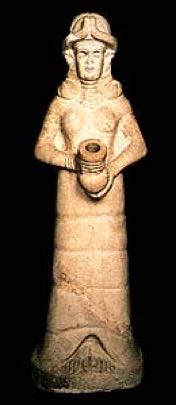
IDENTIFIED: Statue of goddess found in Sumerian ruins in Mari, Syria, now in National Museum of Aleppo.
The back of the 500-pound note dated 1958-1992 depicts something described as an ancient religious wheel.
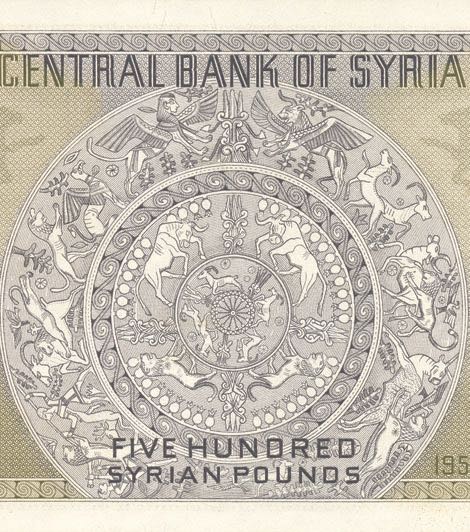
IDENTIFIED: Gold bowl decorated with hunting/animal scenes from the Temple of Baal at Ugarit, now in National Museum in Aleppo.
If anyone has information or leads which may be helpful, please contact me with details.
Courtesy of Yaqoob Alshaer and Murray Hanewich.
The back of the 100-pound note dated 1966-1974 depicts a dam. What's the name and location of this dam?

The front of the 5-pound note dated 1977-1991 depicts a female statue.


IDENTIFIED: Allāt-Minerva. Statue of the 2nd century AD from As-Suwayda, Syria (Roman province). National Museum of Damascus.
The front of the 50-pound note dated 1977-1991 depicts a female statue.


IDENTIFIED: Statue of goddess found in Sumerian ruins in Mari, Syria, now in National Museum of Aleppo.
The back of the 500-pound note dated 1958-1992 depicts something described as an ancient religious wheel.

IDENTIFIED: Gold bowl decorated with hunting/animal scenes from the Temple of Baal at Ugarit, now in National Museum in Aleppo.
If anyone has information or leads which may be helpful, please contact me with details.
Courtesy of Yaqoob Alshaer and Murray Hanewich.
Syria unissued 100- and 1,000-pound notes spotted in Moroccan video
23 01, 2013 14:56 Category: Middle East
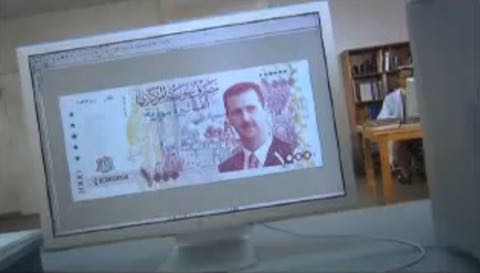
Although recent reports of a 2,000-pound note featuring the portrait of Bashr al Assad have been exposed as obvious fakes, there is credible evidence that the Central Bank of Syria may be working on a 1,000-pound note. This video by the Bank Al-Maghrib in Morocco contains brief images of a 1,000-pound note as well as a 100-pound note (look for them at the 2:40 mark), neither of which have been issued to date. The narration is entirely in French, but even if you don't understand the words, the visuals are interesting to anyone who collects notes and coins from Morocco.
l’usine où est fabriquée la monnaie nationale... by gooal
Courtesy of Zeeshan Ali.
Syria new 2,000-pound note image is a fake
22 01, 2013 13:39 Category: Middle East
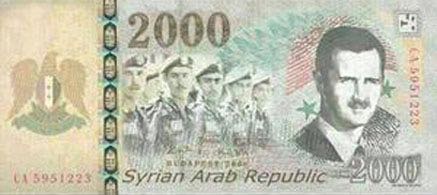
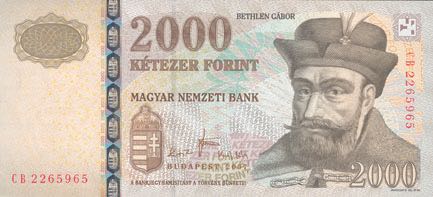
According to an article on YnetNews.com dated 19 January 2013, Syria is planning to introduce a new 2,000-pound (US$28) note in February. While that may be true, the image of the reported note is clearly a fake created using the 2,000-forint note from Hungary (P198).
Syria new banknotes printed by Russia's Goznak confirmed
27 11, 2012 08:15 Category: Middle East
According to a Reuters article dated 13 June 2012, Syria has begun issuing new banknotes printed in Russia by Goznak, that nation's largest security printer. Syria's current 2009 issues (Pick 112-114) were printed by Oesterreichische Banknoten- und Sicherheitsdruck in Austria, but OeBS has pulled out of the troubled country due to international pressure in the wake of the crackdown on protests against President Bashar Assad’s regime. The new Russian-printed notes are of the older design (P111), originally issued in 1997.
The new notes are identical to the 1997 issues, but do not have the small map of Syria on the back, and the English serial numbers at lower right front are normal, not novel (increasing in size). The font of the English serial numbers matches that used on Russian notes printed by Goznak.

According to a subsequent article dated 19 June 2012, Adib Mayyaleh, governor of the Central Bank of Syria, has denied that Russia is printing new notes for Syria, and stated that worn notes are being replaced following a long-established routine.
UPDATE: According to a ProPublica report dated 26 November 2012, records of overflight requests prove that a total of 240 tons of bank notes moved from Moscow to Damascus over a 10-week period beginning 9 July and ending on 15 September.
Courtesy of Thomas Augustsson and Abdullah Beydoun.
The new notes are identical to the 1997 issues, but do not have the small map of Syria on the back, and the English serial numbers at lower right front are normal, not novel (increasing in size). The font of the English serial numbers matches that used on Russian notes printed by Goznak.

According to a subsequent article dated 19 June 2012, Adib Mayyaleh, governor of the Central Bank of Syria, has denied that Russia is printing new notes for Syria, and stated that worn notes are being replaced following a long-established routine.
UPDATE: According to a ProPublica report dated 26 November 2012, records of overflight requests prove that a total of 240 tons of bank notes moved from Moscow to Damascus over a 10-week period beginning 9 July and ending on 15 September.
Courtesy of Thomas Augustsson and Abdullah Beydoun.
Austrian banknote firm may pull out of Syria contract
07 08, 2011 12:00 Category: Europe | Middle East
According to an Associated Press report dated 5 August 2011, OeBS (Oesterreichische Banknoten- und Sicherheitsdruck, Austria) is reviewing its contract to provide banknotes to the Central Bank of Syria. The Austria Press Agency reported that printing company OeBS—a subsidiary of Oesterreichischen Nationalbank, Austria’s central bank—has nearly completed the 2008 contract it has with Syria, and may pull out of the troubled country due to international pressure in the wake of the crackdown on protests against President Bashar Assad’s regime.
Syria new 50-, 100-, and 200-pound notes confirmed
27 07, 2010 12:32 Category: Middle East
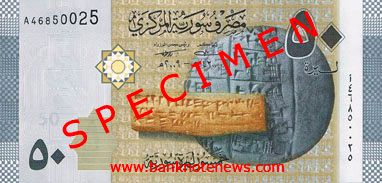
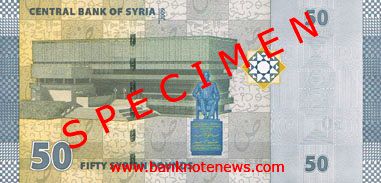
50 pounds (US$1.05), 2009.
Blue and tan. Front: Ancient writing on clay tablets from Ebla. Back: Library of Hafiz Al Assad in Damascus; statue of Hafiz Al Assad. Windowed security thread with demetalized CBS 50. Watermark: Horse head and electrotype 50. Printer: Unknown. 135 x 65 mm.
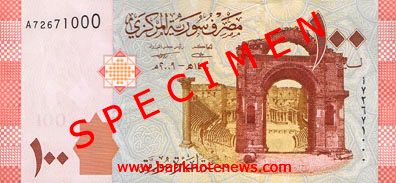
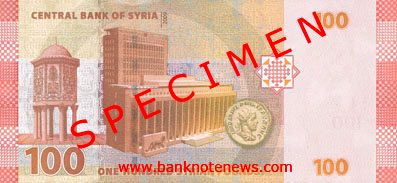
100 pounds (US$2.15), 2009.
Red and tan. Front: Ancient Roman theater and archway of main gate at Bosra. Back: Safe from Umayyad Mosque in Damascus; Central Bank of Syria headquarters building; ancient coin. Windowed security thread with demetalized CBS 100. Watermark: Horse head and electrotype 100. Printer: Unknown. 140 x 65 mm.
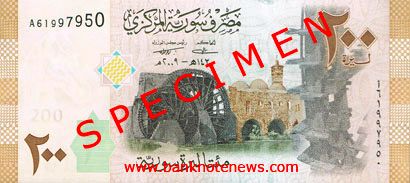
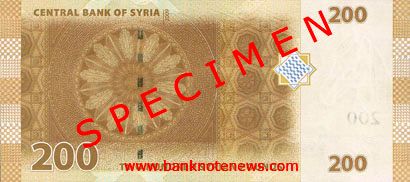
200 pounds (US$4.30), 2009.
Tan and green. Front: Norias (waterwheels) of Hama on the Orontes River. Back: Ceiling of Temple Bel in Palmyra. Windowed security thread with demetalized CBS 200. Watermark: Horse head and electrotype 200. Printer: Unknown. 145 x 65 mm.
These three notes were issued on 27 July 2010 and are dated 2009. They are signed by Adib Mayaleh, Governor and Mohammad Naji Al-Otri, Minister of Economy.
Courtesy of Abdullah Beydoun.
Syria revised 1,000-pound notes dated 1998 confirmed
12 05, 2009 19:01 Category: Middle East
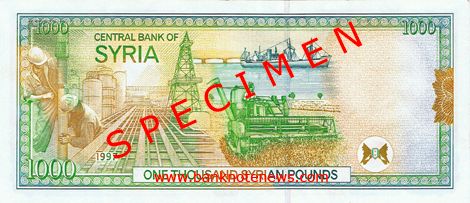
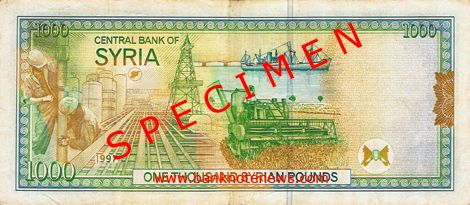
Recently a new variety of the 1,000-pound (US$21.40) note, Pick 111a (top), have been confirmed. The new variety (bottom), has a small map in circle added to back, below “CENTRAL BANK OF SYRIA.” Both notes are dated 1997.
Courtesy of Besher Ghannam.
Syria revised 500-pound notes dated 1998 confirmed
12 05, 2009 18:53 Category: Middle East
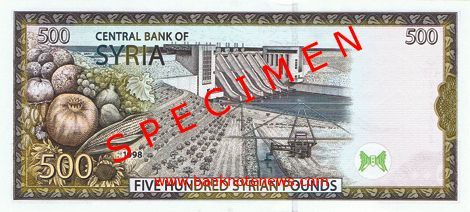
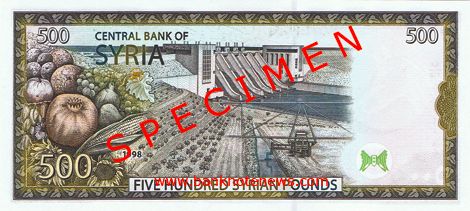
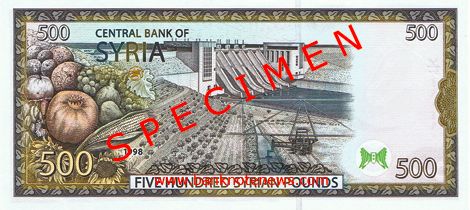
Recently two new varieties of the 500-pound (US$10.70) note, Pick 110a (top), have been confirmed. The first variety (middle), has a small map in circle added to back, below “CENTRAL BANK OF SYRIA.” The second variety (bottom), has the small map, plus a row of leaves added at center bottom, above “FIVE HUNDRED SYRIAN POUNDS,” and the denomination numerals at lower right. All three notes are dated 1998.
Courtesy of banknoteshop@gmx.net and Besher Ghannam.

